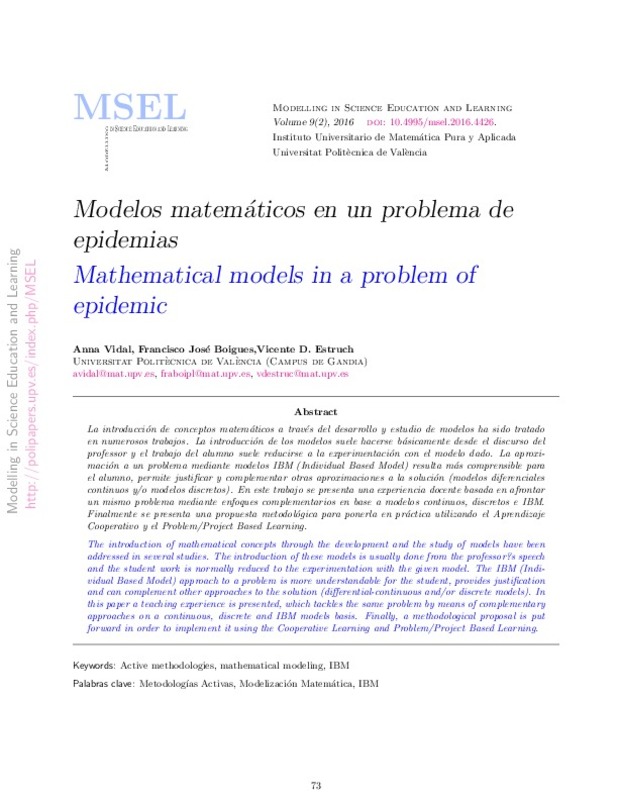JavaScript is disabled for your browser. Some features of this site may not work without it.
Buscar en RiuNet
Listar
Mi cuenta
Estadísticas
Ayuda RiuNet
Admin. UPV
Modelos matemáticos en un problema de epidemias
Mostrar el registro sencillo del ítem
Ficheros en el ítem
| dc.contributor.author | Vidal Meló, Anna
|
es_ES |
| dc.contributor.author | Boigues Planes, Francisco José
|
es_ES |
| dc.contributor.author | Estruch Fuster, Vicente Domingo
|
es_ES |
| dc.date.accessioned | 2016-09-15T11:58:27Z | |
| dc.date.available | 2016-09-15T11:58:27Z | |
| dc.date.issued | 2016-01-27 | |
| dc.identifier.issn | 1988-3145 | |
| dc.identifier.uri | http://hdl.handle.net/10251/69779 | |
| dc.description.abstract | [EN] The introduction of mathematical concepts through the development and the study of models have been addressed in several studies. The introduction of these models is usually done from the professor's speech and the student work is normally reduced to the experimentation with the given model. The IBM (Individual Based Model) approach to a problem is more understandable for the student, provides justi cationand can complement other approaches to the solution (di erential-continuous and/or discrete models). In this paper a teaching experience is presented, which tackles the same problem by means of complementary approaches on a continuous, discrete and IBM models basis. Finally, a methodological proposal is put forward in order to implement it using the Cooperative Learning and Problem/Project Based Learning | es_ES |
| dc.description.abstract | [ES] La introducción de conceptos matemáticos a través del desarrollo y estudio de modelos ha sido tratado en numerosos trabajos. La introducción de los modelos suele hacerse básicamente desde el discurso del professor y el trabajo del alumno suele reducirse a la experimentación con el modelo dado. La aproximación a un problema mediante modelos IBM (Individual Based Model) resulta más comprensible para el alumno, permite justificar y complementar otras aproximaciones a la solución (modelos diferenciales continuos y/o modelos discretos). En este trabajo se presenta una experiencia docente basada en afrontar un mismo problema mediante enfoques complementarios en base a modelos continuos, discretos e IBM. Finalmente se presenta una propuesta metodológica para ponerla en práctica utilizando el Aprendizaje Cooperativo y el Problem/Project Based Learning. | es_ES |
| dc.language | Español | es_ES |
| dc.publisher | Universitat Politècnica de València | |
| dc.relation.ispartof | Modelling in Science Education and Learning | |
| dc.rights | Reconocimiento - No comercial (by-nc) | es_ES |
| dc.subject | Active methodologies | es_ES |
| dc.subject | Mathematical modeling | es_ES |
| dc.subject | Metodologías Activas | es_ES |
| dc.subject | Modelización Matemática | es_ES |
| dc.subject | IBM | es_ES |
| dc.title | Modelos matemáticos en un problema de epidemias | es_ES |
| dc.title.alternative | Mathematical models in a problem of epidemic | es_ES |
| dc.type | Artículo | es_ES |
| dc.date.updated | 2016-09-14T10:46:14Z | |
| dc.identifier.doi | 10.4995/msel.2016.4426 | |
| dc.rights.accessRights | Abierto | es_ES |
| dc.contributor.affiliation | Universitat Politècnica de València. Instituto de Investigación para la Gestión Integrada de Zonas Costeras - Institut d'Investigació per a la Gestió Integrada de Zones Costaneres | es_ES |
| dc.contributor.affiliation | Universitat Politècnica de València. Escuela Politécnica Superior de Gandia - Escola Politècnica Superior de Gandia | es_ES |
| dc.contributor.affiliation | Universitat Politècnica de València. Departamento de Matemática Aplicada - Departament de Matemàtica Aplicada | es_ES |
| dc.description.bibliographicCitation | Vidal Meló, A.; Boigues Planes, FJ.; Estruch Fuster, VD. (2016). Modelos matemáticos en un problema de epidemias. Modelling in Science Education and Learning. 9(1):73-86. https://doi.org/10.4995/msel.2016.4426 | es_ES |
| dc.description.accrualMethod | SWORD | es_ES |
| dc.relation.publisherversion | https://doi.org/10.4995/msel.2016.4426 | es_ES |
| dc.description.upvformatpinicio | 73 | es_ES |
| dc.description.upvformatpfin | 86 | es_ES |
| dc.type.version | info:eu-repo/semantics/publishedVersion | es_ES |
| dc.description.volume | 9 | |
| dc.description.issue | 1 | |
| dc.description.references | Amelkin V. (1987) Ciencia popular. Ecuaciones diferenciales aplicadas a la práctica.Mir-Moscú. | es_ES |
| dc.description.references | Aronson E. & Patnoe S. (1997) The Jigsaw Classroom, Building Cooperation in the Classroom, Longman (second edition), United States . | es_ES |
| dc.description.references | Brauer F., van den Driessche P. y Wu J. (Ed.) (2008). Mathematical Epidemiology (Lecture Notes in Mathematics / Mathematical Biosciences Subseries). Springer-Verlag. | es_ES |
| dc.description.references | CHROBAK, J. M., & HERRERO, H. (2011). A MATHEMATICAL MODEL OF INDUCED CANCER-ADAPTIVE IMMUNE SYSTEM COMPETITION. Journal of Biological Systems, 19(03), 521-532. doi:10.1142/s0218339011004111 | es_ES |
| dc.description.references | Grimm, V., & Railsback, S. F. (2005). Individual-based Modeling and Ecology. doi:10.1515/9781400850624 | es_ES |
| dc.description.references | Kermack, W. O., & McKendrick, A. G. (1927). A Contribution to the Mathematical Theory of Epidemics. Proceedings of the Royal Society A: Mathematical, Physical and Engineering Sciences, 115(772), 700-721. doi:10.1098/rspa.1927.0118 | es_ES |
| dc.description.references | Nagle R. Kent, Saff Edward B., Snider Arthur D. (2005). Ecuaciones diferenciales y problemas con valores en la frontera. Pearson Educación. | es_ES |
| dc.description.references | Markham T. (2003). Project Based Learning, a guide to Standard-focused project based. Buck Institute for Education | es_ES |
| dc.description.references | Railsback, S. F. (2001). Concepts from complex adaptive systems as a framework for individual-based modelling. Ecological Modelling, 139(1), 47-62. doi:10.1016/s0304-3800(01)00228-9 | es_ES |
| dc.description.references | Shannon, R., & Johannes, J. D. (1976). Systems Simulation: The Art and Science. IEEE Transactions on Systems, Man, and Cybernetics, SMC-6(10), 723-724. doi:10.1109/tsmc.1976.4309432 | es_ES |
| dc.description.references | Woods D. R. (1994). Problem-based Learning: How to gain the most from PBL, The Book Store, McMaster University, Hamilton. | es_ES |
| dc.description.references | Zill Dennis G. (2009). Ecuaciones Diferenciales con aplicaciones de modelado. México : Cengage Learning. | es_ES |








